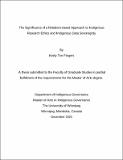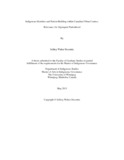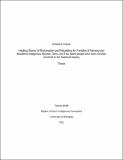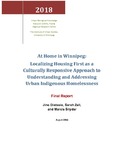| dc.contributor.author | Ten Fingers, Keely | |
| dc.date.accessioned | 2020-12-18T19:15:30Z | |
| dc.date.available | 2020-12-18T19:15:30Z | |
| dc.date.issued | 2020-12-08 | |
| dc.identifier.citation | Ten Fingers, Keely. The Significance of a Relations-based Approach to Indigenous Research Ethics and Indigenous Data Sovereignty; A thesis submitted to the Faculty of Graduate Studies in partial fulfilment of the requirements for the Master of Arts degree, Department of Indigenous Governance, Master of Arts in Indigenous Governance. Winnipeg, Manitoba, Canada: The University of Winnipeg, December 2020. DOI: 10.36939/ir.202012181310. | en_US |
| dc.identifier.uri | https://hdl.handle.net/10680/1885 | |
| dc.description.abstract | BACKGROUND: Indigenous people have been increasingly asserting self-determination in research to “research ourselves back to life”. There is a current knowledge gap regarding how gender is considered in Indigenous research ethics and its implications for Indigenous self-determination in research. METHODS: Utilizing critical discourse analysis and a decolonizing theoretical framework a systematic review was conducted to contribute to filling this knowledge gap. RESULTS: The dominant concept and language of gender as binary are being used in Indigenous research conducted in observance of Indigenous research and it is given significance through its continued use, particularly in relation to participant sampling and bias. The mainstream concept is also given significance because research involving Indigenous people is in response to inequities resulting from colonization. However, there is resistance to this concept and its significance by revitalizing and renewing Indigenous Ways of Knowing (research paradigms including epistemology, methodology, methods, and theories) such as language and most significantly, elevating relations (human-to-human and human-to-nature) as part of Indigenous Ways of Being (ontology). The implications of this recovery and renewal is alignment and strengthening of Indigenous Data Sovereignty. This is ethical Indigenous research. CONCLUSION: “Researching ourselves back to life” involves going back to the very beginning, to our very being as Indigenous peoples and relating this to how we understand, conduct, and utilize ethical research to express and reflect our reality for wellness, governance, and nation-(re)building. | en_US |
| dc.language.iso | en | en_US |
| dc.publisher | University of Winnipeg | en_US |
| dc.rights | info:eu-repo/semantics/openAccess | en_US |
| dc.subject | Indigenous Ways of Being | en_US |
| dc.subject | Indigenous Ways of Knowing | en_US |
| dc.subject | Indigenous research ethics | en_US |
| dc.subject | Indigenous self-determination in research | en_US |
| dc.subject | Indigenous Data Sovereignty | en_US |
| dc.subject | Indigenous Data Governance | en_US |
| dc.subject | Decolonizing data | en_US |
| dc.title | The Significance of a Relations-based Approach to Indigenous Research Ethics and Indigenous Data Sovereignty | en_US |
| dc.type | Thesis | en_US |
| dc.description.degree | Master of Arts in Indigenous Governance | en_US |
| dc.publisher.grantor | University of Winnipeg | en_US |
| dc.identifier.doi | 10.36939/ir.202012181310 | en_US |
| thesis.degree.discipline | Indigenous Governance | |
| thesis.degree.level | masters | |
| thesis.degree.name | Master of Arts in Indigenous Governance | |
| thesis.degree.grantor | University of Winnipeg | |




